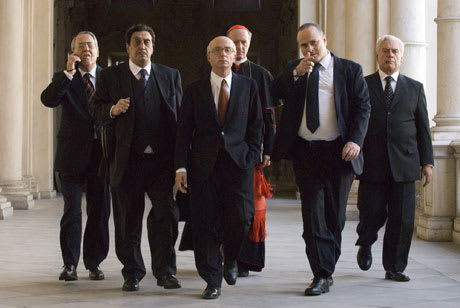Paolo Sorrentino's Il Divo begins with an "Italian glossary" that defines several key Italian political terms from the early '90s. I appreciate that the glossary was trying to make the experience easier for viewers but I was left with more questions than answers. Questions like, "Wait, hang on... could you say all that again, a little slower?"
Well, the movie doesn't slow down. Seemingly dozens of true-life characters are introduced, corrupted, killed, elected, rejected and put on trial throughout Il Divo's 110 minutes, and it is with considerable embarrassment that I report I had trouble following this film. I know nothing about Italian politics and would have greatly appreciated non-stop commentary by historians with graphs and pie charts to help keep me oriented.
I did gather, however, that the film is about Giulio Andreotti (nicely played by Toni Servillo), leader of Italy's Christian Democrat party, which ruled virtually unopposed for 44 years. Of course, absolute power corrupts absolutely and the party crumbled in the early '90s as mob connections and other corruption became public knowledge. The film is a whirlwind look at the Christian Democrats' last months of power, with every murder, suicide, investigation and scandal accounted for.
Sorrentino's aggressive directorial virtuosity recalls Goodfellas- and Casino-era Martin Scorsese, with lots of long tracking shots, fast cutting, roving camerawork and a general atmosphere of hyperactivity. Il Divo is reminiscent of Goodfellas also in its heavy violence quotient and its operatic fall-from-grace story structure.
Sorrentino's style is entertaining but never engrossing. There is something coolly distancing about his flair for the ostentatious. But look: at Cannes, Il Divo took home the Jury Prize (or, basically, third place), so it has its defenders.
I suspect this film will improve upon repeat viewings when the labyrinthine intricacy of its plot will become a little clearer.
(Mongrel Media)Well, the movie doesn't slow down. Seemingly dozens of true-life characters are introduced, corrupted, killed, elected, rejected and put on trial throughout Il Divo's 110 minutes, and it is with considerable embarrassment that I report I had trouble following this film. I know nothing about Italian politics and would have greatly appreciated non-stop commentary by historians with graphs and pie charts to help keep me oriented.
I did gather, however, that the film is about Giulio Andreotti (nicely played by Toni Servillo), leader of Italy's Christian Democrat party, which ruled virtually unopposed for 44 years. Of course, absolute power corrupts absolutely and the party crumbled in the early '90s as mob connections and other corruption became public knowledge. The film is a whirlwind look at the Christian Democrats' last months of power, with every murder, suicide, investigation and scandal accounted for.
Sorrentino's aggressive directorial virtuosity recalls Goodfellas- and Casino-era Martin Scorsese, with lots of long tracking shots, fast cutting, roving camerawork and a general atmosphere of hyperactivity. Il Divo is reminiscent of Goodfellas also in its heavy violence quotient and its operatic fall-from-grace story structure.
Sorrentino's style is entertaining but never engrossing. There is something coolly distancing about his flair for the ostentatious. But look: at Cannes, Il Divo took home the Jury Prize (or, basically, third place), so it has its defenders.
I suspect this film will improve upon repeat viewings when the labyrinthine intricacy of its plot will become a little clearer.
